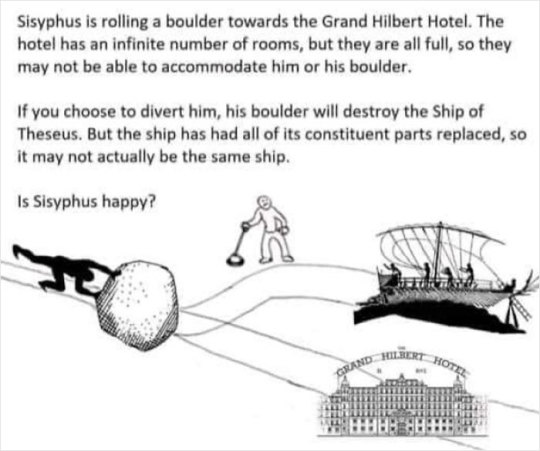Text

Hannah Arendt, October 14, 1906 – December 4, 1975.
135 notes
·
View notes
Text
chinese room 2
So there’s this guy, right? He sits in a room by himself, with a computer and a keyboard full of Chinese characters. He doesn’t know Chinese, though, in fact he doesn’t even realise that Chinese is a language. He just thinks it’s a bunch of odd symbols. Anyway, the computer prints out a paragraph of Chinese, and he thinks, whoa, cool shapes. And then a message is displayed on the computer monitor: which character comes next?
This guy has no idea how the hell he’s meant to know that, so he just presses a random character on the keyboard. And then the computer goes BZZZT, wrong! The correct character was THIS one, and it flashes a character on the screen. And the guy thinks, augh, dammit! I hope I get it right next time. And sure enough, computer prints out another paragraph of Chinese, and then it asks the guy, what comes next?
He guesses again, and he gets it wrong again, and he goes augh again, and this carries on for a while. But eventually, he presses the button and it goes DING! You got it right this time! And he is so happy, you have no idea. This is the best day of his life. He is going to do everything in his power to make that machine go DING again. So he starts paying attention. He looks at the paragraph of Chinese printed out by the machine, and cross-compares it against all the other paragraphs he’s gotten. And, recall, this guy doesn’t even know that this is a language, it’s just a sequence of weird symbols to him. But it’s a sequence that forms patterns. He notices that if a particular symbol is displayed, then the next symbol is more likely to be this one. He notices some symbols are more common in general. Bit by bit, he starts to draw statistical inferences about the symbols, he analyses the printouts every way he can, he writes extensive notes to himself on how to recognise the patterns.
Over time, his guesses begin to get more and more accurate. He hears those lovely DING sounds that indicate his prediction was correct more and more often, and he manages to use that to condition his instincts better and better, picking up on cues consciously and subconsciously to get better and better at pressing the right button on the keyboard. Eventually, his accuracy is like 70% or something – pretty damn good for a guy who doesn’t even know Chinese is a language.
* * *
One day, something odd happens.
He gets a printout, the machine asks what character comes next, and he presses a button on the keyboard and– silence. No sound at all. Instead, the machine prints out the exact same sequence again, but with one small change. The character he input on the keyboard has been added to the end of the sequence.
Which character comes next?
This weirds the guy out, but he thinks, well. This is clearly a test of my prediction abilities. So I’m not going to treat this printout any differently to any other printout made by the machine – shit, I’ll pretend that last printout I got? Never even happened. I’m just going to keep acting like this is a normal day on the job, and I’m going to predict the next symbol in this sequence as if it was one of the thousands of printouts I’ve seen before. And that’s what he does! He presses what symbol comes next, and then another printout comes out with that symbol added to the end, and then he presses what he thinks will be the next symbol in that sequence. And then, eventually, he thinks, “hm. I don’t think there’s any symbol after this one. I think this is the end of the sequence.” And so he presses the “END” button on his keyboard, and sits back, satisfied.
Unbeknownst to him, the sequence of characters he input wasn’t just some meaningless string of symbols. See, the printouts he was getting, they were all always grammatically correct Chinese. And that first printout he’d gotten that day in particular? It was a question: “How do I open a door.” The string of characters he had just input, what he had determined to be the most likely string of symbols to come next, formed a comprehensible response that read, “You turn the handle and push”.
* * *
One day you decide to visit this guy’s office. You’ve heard he’s learning Chinese, and for whatever reason you decide to test his progress. So you ask him, “Hey, which character means dog?”
He looks at you like you’ve got two heads. You may as well have asked him which of his shoes means “dog”, or which of the hairs on the back of his arm. There’s no connection in his mind at all between language and his little symbol prediction game, indeed, he thinks of it as an advanced form of mathematics rather than anything to do with linguistics. He hadn’t even conceived of the idea that what he was doing could be considered a kind of communication any more than algebra is. He says to you, “Buddy, they’re just funny symbols. No need to get all philosophical about it.”
Suddenly, another printout comes out of the machine. He stares at it, puzzles over it, but you can tell he doesn’t know what it says. You do, though. You’re fluent in the language. You can see that it says the words, “Do you actually speak Chinese, or are you just a guy in a room doing statistics and shit?”
The guy leans over to you, and says confidently, “I know it looks like a jumble of completely random characters. But it’s actually a very sophisticated mathematical sequence,” and then he presses a button on the keyboard. And another, and another, and another, and slowly but surely he composes a sequence of characters that, unbeknownst to him, reads “Yes, I know Chinese fluently! If I didn’t I would not be able to speak with you.”
That is how ChatGPT works.
47K notes
·
View notes
Text
‘Facts, facts, facts,’ cries the scientist if he wants to emphasize the necessity of a firm foundation for science. What is a fact? A fact is a thought that is true. But the scientist will surely not recognize something which depends on men’s varying states of mind to be the firm foundation of science.
Gottlob Frege, Logical Investigations
47 notes
·
View notes
Text
“Reason is not measured by size or height, but by principle.”
— Epictetus, Discourses
41 notes
·
View notes
Text
Our perception of spacetime dictates how we move through it.
39 notes
·
View notes
Text
“Ignorance is bold.”
— Thucydides, History of the Peloponnesian War
899 notes
·
View notes
Text
“Good can exist without evil, but evil cannot exist without good.”
— Augustine, Enchiridion
1K notes
·
View notes
Text
“Everybody dies, but not everybody lives.”
— unknown - (hatin)
114K notes
·
View notes
Text
“Thoughts without content are empty, intuitions without concepts are blind. The understanding can intuit nothing, the senses can think nothing. Only through their unison can knowledge arise.”
— Immanuel Kant, Critique of Pure Reason
361 notes
·
View notes
Text
“No state more extensive than the minimal state can be justified.”
— Robert Nozick, Anarchy, State, and Utopia
249 notes
·
View notes
Text
“Art shows us the miracles of nature.”
— Ludwig Wittgenstein, Culture and Value
262 notes
·
View notes
Text
“The absurd does not liberate; it binds. It does not authorize all actions. “Everything is permitted” does not mean that nothing is forbidden.”
— Albert Camus, The Myth of Sisyphus
693 notes
·
View notes
Text
“How can you be certain that your whole life is not a dream?”
— Rene Descartes
260 notes
·
View notes
Text
“Science is what we know, and philosophy is what we don’t know.”
— Bertrand Russell, Unpopular Essays
1K notes
·
View notes


